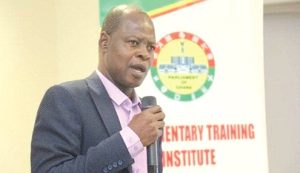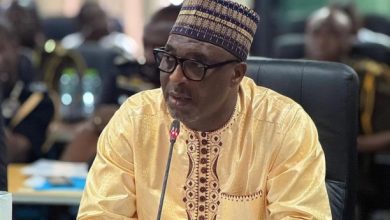Oil money to drive ‘Big Push’
Oil money to drive ‘Big Push’ - Petroleum revenue law amended to channel 70% proceeds to infrastructure - Experts applaud move

The recent amendment of the Petroleum Revenue Management Act, 2011 (Act 815) to ensure that the entire Annual Budget Funding Amount (ABFA) is dedicated solely to infrastructural development has received the endorsement of stakeholders in the petroleum sector.
The stakeholders explained that the amendment would now enable allocations to focus on large-scale and high-impact projects that could generate substantial returns.
That would be different from the previous regime where funding was spread across multiple small-scale projects which limited their impact on the citizenry, they argued.
The stakeholders, including representatives of the Natural Resource Governance Institute (NRGI) and the Ghana Extractive Industries Transparency Initiative (GHEITI), however, expressed concerns that the recent PRMA amendment process was insufficiently inclusive, lacking meaningful input and participation from relevant stakeholders, which led to notable shortcomings.
Others, including petroleum economists, called for a comprehensive review of the PRMA by engaging all relevant stakeholders to address the various loopholes and challenges that have emerged during its 13-year implementation period.
Context
The government recently amended some sections of the Petroleum Revenue Management Act, 2011 (Act 815) to ensure that the ABFA is dedicated solely to infrastructural development.

The amendment will ensure that all ABFA funds are dedicated to infrastructure projects under ‘The Big Push’ programme to deliver significant, high-impact projects that will leave a lasting legacy.
It is expected to enhance the efficient utilisation of petroleum revenues and yield tangible developmental outcomes.
ABFA utilisation
Data sourced from the Public Interest and Accountability Committee (PIAC) show that the country has funded various development projects from oil revenue to the tune of GH¢27.51 billion since commercial oil production began in 2011.
It was consistently facilitated through the ABFA under the PRMA by various governments under three Presidents between 2011 and 2024.
The data further show that the governments of Prof. John Evans Atta Mills and John Dramani Mahama were allocated GH¢3.31 billion between 2011 and 2016, while Nana Addo Dankwa Akufo-Addo’s administration disbursed GH¢24.20 billion from 2017 to 2024.
However, many stakeholders have raised concerns that allocations of the ABFA were spread across multiple projects which limited their impact and reduced the ability to complete transformative legacy projects.
Welcome move
The Dean of the University of Cape Coast School of Business, Professor John Gatsi, welcomed the amendment as a laudable move by the government.
“The decision to channel ABFA towards infrastructure development is significant. However, the PRMA created a key stakeholder, which is PIAC, that needs to be engaged.
“And so, if there are opportunities for the stakeholders, such as PIAC, to be engaged on the amendment, we must do that as soon as possible to ensure efficient management of the oil proceeds,” he said.
Prof. Gatsi said the government must stay focused on its manifesto promise prior to the 2024 general election, which sought to undertake a comprehensive review of the PRMA to ensure efficiency.
“Of course, there are other areas of the law which have not been touched yet. For example, the law will be 15 years in 2026, and it states that after 15 years of coming into force, the accrued interest on the Heritage Fund can be used in the same manner as the ABFA,” the professor of finance pointed out.
Prof. Gatsi added that in spite of the recent amendment, the government could initiate a review process to help improve the law to ensure efficient management of the oil proceeds.
A Senior Programme Officer for Africa at the Natural Resource Governance Institute (NRGI), Dennis Gyeyir, said the amendment was a positive step by the government but there was the need for comprehensive stakeholder consultations.
He said that would help inform a thorough review to tackle the loopholes and challenges that had arisen during the implementation of the Act over the past 14 years.
“The recent amendment of the Act was not consultative; a number of stakeholders were not involved.
I am aware that PIAC and others with the mandate to monitor the utilisation of petroleum proceeds and ensure compliance were not consulted, even though the amendment seems to be positive.
“If proper consultations were done, the amendment could have benefited from industry stakeholders such as PIAC, Africa Centre for Energy Policy (ACEP), Ghana Integrity Initiative (GII), and Ghana Anti-Corruption Coalition (GACC) with vast experience to share,” Mr Gyeyir said.
He expressed concern that under the current amendment, the fate of key institutions such as the Public Interest and Accountability Committee (PIAC) and the Minerals Income Investment Fund (MIIF) remained uncertain.
Mr Gyeyir added that the government must develop a long-term national development plan to guide the utilisation of the petroleum proceeds instead of amending just a section out of the 60 sections of the PRMA.
Change the approach
For his part, the Co-Chair of the Ghana Extractive Industries Transparency Initiative (GHEITI), Dr Steve Manteaw, commended the government for amending the PRMA to help finance infrastructure in the country.
He explained that it was time for the government to take deliberate steps to shift how proceeds from all natural resources were spent from consumption to investment.
Dr Manteaw, who is a former chairman of PIAC, stated that investing the proceeds would help facilitate growth in natural resource revenues to support the national development agenda.
“In the past, the petroleum revenue was used for recurrent expenditure. It is basically used to finance what we call in Ghana “chop money” to support the budget. As a country, we have mined gold for 100 years and yet no one can remember what the proceeds were used for because they were used to support the budget and pay salaries of workers,” he stated.
However, Dr Manteaw said it was unwise for the country to continue to spend proceeds from natural resources rather than investing them.
He said the previous National Democratic Congress (NDC) government under President John Mahama between 2013 to 2017 invested $30 million of oil proceeds into the construction of Terminal Three of the Kotoka International Airport (KIA).
“Today, the $30 million invested has yielded more than $40 million, so just imagine if we had invested $1 billion,” Dr Manteaw stated.
While throwing his weight behind the amendment, he also drew attention to a relook at funding PIAC from the Consolidated Fund which may affect its independence and activities.
Dr Manteaw explained that the minister being given the power to determine the appropriate funds to support PIAC and its activities may be problematic once the institution gets into the bad books of the Minister of Finance for the work cut out for it to do.
“If we are not careful and PIAC produces a report which the minister is not happy about, PIAC may be starved of funds, and this has happened in the past.
“I propose that the law must be adjusted to ensure that the Parliamentary Committee for Mines and Energy approves the budget of PIAC instead of the minister, as the new amendment stipulates,” Dr Manteaw added.
PIAC’s position
The PIAC Chairperson, Constantine Kudzedzi, said the committee was making several attempts to engage the Presidency and Parliament to determine the next steps.
However, a committee member, who wished to remain anonymous, revealed that the funds allocated to PIAC for its activities this year had been significantly reduced by over half compared to last year.
“This drastic cut will severely impact our operations,” the member explained, attributing the reduction to PIAC’s funding not coming from the ABFA, making it more vulnerable to budgetary constraints.



